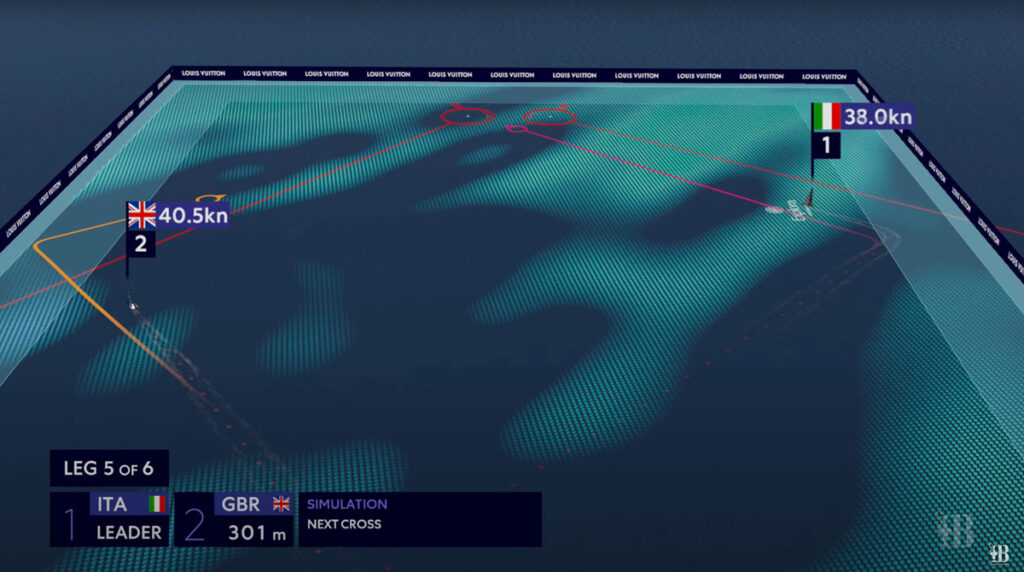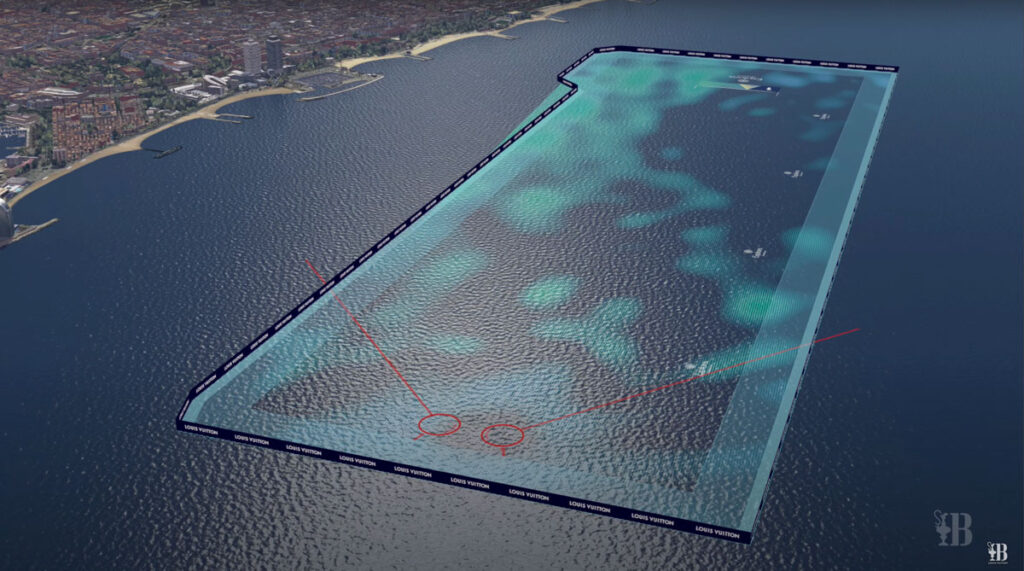SB Television
Real-time Wind Overlay Feature Added to Cup Broadcast
 A graphic overlay showing real-time wind on the racecourse was featured on the first broadcast of the Preliminary Regatta, an enhancement to demonstrate the importance of “connecting the dots.”
America’s Cup Media
A graphic overlay showing real-time wind on the racecourse was featured on the first broadcast of the Preliminary Regatta, an enhancement to demonstrate the importance of “connecting the dots.”
America’s Cup Media
Capgemini and the America’s Cup Media revealed WindSight IQ, the product innovation they will bring to the broadcast of the Louis Vuitton 37th America’s Cup, as part of their global partnership announced earlier this year. For the first time, viewers and race commentators will be able to actually see the wind and how it varies across the racecourse in real-time. Furthermore, a yacht simulator will take the wind data and calculate the optimal routes around the course, enabling commentators and viewers to predict what teams on the water should do or analyze how teams could have won a race. A feat of engineering and design, WindSight IQ means that commentators and viewers will have more data and insight into the pinnacle event of international sailing than is available to the competing teams on the water.
Viewing habits are changing, a recent study by the Capgemini Research Institute found that 84 percent of fans say emerging technologies have enhanced their overall viewing experience. With 77 percent of Gen Z and 75 percent of Millennials preferring to watch sport outside of live venues, the viewing experience on screen is more important than ever. Wind patterns are a key factor in sailing that can change the course of a race and make the difference between winning or losing. For the first time, these wind patterns will be revealed and visualized by WindSight IQ to bring a whole new dimension to the race experience for fans and broadcasters.
“WindSight IQ is an innovation America’s Cup Media have been evaluating for a long time now, our objective has been to take another quantum leap in using technology to increase the understanding of sailing and the intricacies that the sailors at the pinnacle of our sport have to conquer. But to achieve our objective we needed to find a partner that was equally driven by pushing the boundaries of technology and innovation which Capgemini clearly were. So, for the Louis Vuitton 37th America’s Cup WindSight IQ is a significant advancement for the consumption of our sport,” explains Grant Dalton, CEO of the America’s Cup Event.
 Using Lidar and wind data from buoys and boats on the course, the AC broadcast can now show where wind is, real-time, on the racecourse. Top left looking strong.
America’s Cup
Using Lidar and wind data from buoys and boats on the course, the AC broadcast can now show where wind is, real-time, on the racecourse. Top left looking strong.
America’s Cup
“Four elements determine the race winner: the boat design, the team, the water, and the wind. Before and during the race, commentators will now be able to see the real-time wind patterns and explain to the viewers the options for the competing yachts. Being able to see the unseen wind and compare teams’ actual performances and tactical decisions to the optimum routes, will mean audiences can follow and engage in the racing on a whole new level. We are really looking forward to the impact WindSight IQ will bring to this year’s Louis Vuitton 37th America’s Cup viewing experience.”
Due to the technical challenge, no-one has been able to accurately demonstrate visualization of the wind in real-time yacht racing conditions – until now. Combining its expertise in technology, engineering, data and design, Capgemini and America’s Cup Media, the host broadcaster for the event, will use LiDAR (light detection and ranging), sensor fusion and scientific computation to reveal the wind in augmented reality (AR) and virtual reality (VR) graphics. The wind field data is also fed in real-time to a yacht simulator and used to create a live ‘ghost boat’ simulation that can be projected onto the racecourse through AR and VR graphics. It will show the optimal path that the crews should take given the measured variations in wind pressure, sheers, orientation, and speed.
To accurately collect raw wind data, three LiDARs have been positioned along the Barcelona waterfront overlooking the racecourse, scanning the full race area. Each LiDAR has an average 6.5km scanning range up to a maximum of 12km, and measures wind speeds, every 1.5 meters from 0 to 12km, up to 38m/s (73 knots) with an accuracy of <0.1m/s. WindSight IQ supplements the LiDARs with wind data directly from the racing yachts and buoys’ wind sensors. All these data streams are fused using innovative algorithms to enable a wind field to be created over the entire racecourse. The wind field is refreshed every second based on the sensor measurements and predictive wind models.
“Through technological innovation, combining laser sensor technology with advanced engineering and new visualization techniques, WindSight IQ brings together the digital and physical worlds,” explains Keith Williams, Capgemini’s Chief Engineer for WindSight IQ. “The wind plays a decisive role in the teams’ choices during the race, and by visualizing it, viewers can now see and comprehend the detailed pattern of wind speed and direction across the racecourse, as well as the best potential paths to be followed. The core challenge of this innovation lies in combining both engineering and design; accurately capturing the intricate patterns of the wind and also portraying it in a way that fans and commentators can easily see and understand. Our goal is to make the coverage of the Louis Vuitton 37th America’s Cup more captivating and immersive than it has ever been.”
WindSight IQis a turnkey solution designed, built and operated through a partnership between America’s Cup Media and Capgemini, combining its expertise in technology, engineering, data and design to feed the America’s Cup Media broadcast systems with real-time wind field visuals and AR/VR designs. The three LiDARs used as part of the solution are supplied by LUMIBIRD.
The post Real-time Wind Overlay Feature Added to Cup Broadcast appeared first on Sailing World.
- Home
- About Us
- Write For Us / Submit Content
- Advertising And Affiliates
- Feeds And Syndication
- Contact Us
- Login
- Privacy
All Rights Reserved. Copyright , Central Coast Communications, Inc.